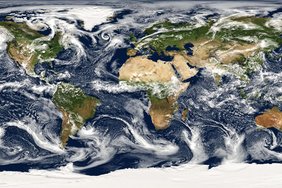Despite decades of research, what will happen to rainfall in years to come remains unknown, and severe floods as well as prolonged droughts are already defying expectations. Today, in a paper published in Nature Climate Change, scientists argue that the answers exist but a huge joint international investment in resources, expertise, and infrastructure is urgently needed to develop much more advanced climate models.
Lead author Professor Dame Julia Slingo, of the University of Bristol´s Cabot Institute for the Environment, said: “The basis around which climate models have been built over the last 30 years grossly simplifies water-bearing systems, missing some fundamental physics that we now know is essential for reliable predictions. The solution is within our grasp; we must take a quantum leap from our current 100 kilometre-scale global climate models to 1 kilometre-scale models.”
Co-author Professor Bjorn Stevens from the Max Planck Institute for Meteorology, a pioneer of kilometer-scale global models, emphasizes that the science behind this is irrefutable. “At these scales the complex physics of rain-bearing systems is properly represented for the first time, with consequences that reach far beyond the future of our water, to many aspects of climate change,” says Stevens.
The international team presents a case for the creation and resourcing of a federated group of leading modelling centres, linked to dedicated, pioneering Exascale computing and data facilities. The goal is to build an operational kilometre-scale climate prediction system that will serve all nations, providing them with robust evidence across all aspects of climate change.
“The big vision is to create a digital twin of Earth based on these predictions. The European Initiative Destination Earth (DestinE) is already leading the way, but the urgency and international dimension of the project would benefit from even greater mobilisation of resources and collaboration to achieve what is needed,” says co-author Dr. Peter Bauer, a Director of DestinE and leading scientist at ECMWF.
Professor Stephen Belcher, co-author and chief scientist at the UK Met Office, said: “The scale of the task is formidable. Even though our scientific understanding has moved on, as have the technological developments in computing and data storage, this endeavour requires an international effort.”
Floods and droughts are among the costliest impacts of climate change, and changes in the seasonality and natural variability of rainfall can have profound effects on many living systems, in turn threatening our food security, water security, health, and infrastructure investments. Yet how little we know about the future of our water was crystalized in the recent Assessment Report of the IPCC; this showed, yet again, substantial uncertainties in rainfall changes, especially at regional and local scales.
Professor Tim Palmer, co-author from the University of Oxford, says: “This is urgent. What we need now is a ‘Mission to Planet Earth’ that addresses the dangers that climate change poses and is resourced accordingly. The world is already experiencing extremes that lie outside what the current models can tell us, and our social and economic structures are already massively exposed.”
Professor Thomas Stocker, co-author and former Chair of Working Group I of the IPCC AR5, endorses this view. “The twin goals of Net Zero and climate resilience require a substantial acceleration in the delivery of reliable and actionable climate information, particularly for the most vulnerable regions. The current climate models cannot provide this, but global investment and scientific partnerships in kilometer-scale global modelling will make this a reality.”
Co-author Professor Georg Teutsch from the Helmholtz Centre for Environmental Research, who chairs one of the largest climate adaptation research initiatives in Europe, is acutely aware of this issue: “We now have very granular and sophisticated impact models, but we lack the detailed weather and water information to drive them. We cannot make reliable decisions on adaptation until that gap is closed,” says Teutsch.
Co-author Paul Bates, Professor of Hydrology at the University of Bristol, added: “This proposed investment pales into insignificance against climate-related losses, even today. It represents about 0.1% of the estimated annual costs of hydrological extremes, not counting for the lost lives, and these costs will only rise as climate change continues to bite.”
Author list:
Dame Julia Slingo, Cabot Institute, University of Bristol
Prof. Paul Bates, Cabot Institute, University of Bristol, and Fathom, 17-18, Berkeley Square, Bristol
Dr. Peter Bauer, European Centre for Medium-Range Weather Forecasts, Reading
Prof. Stephen Belcher, Met Office, Exeter
Prof. Tim Palmer, University of Oxford
Dr. Graeme Stephens, NASA Jet Propulsion Laboratory, Caltech, Pasadena
Prof. Bjorn Stevens, Max Planck Institute für Meteorology, Hamburg
Prof. Thomas F. Stocker, Oeschger Centre for Climate Change Research, University of Bern
Prof. Georg Teutsch, Helmholtz Centre for Environmental Research, Leipzig
Original publication:
Slingo, J., P. Bates, P. Bauer, S. Belcher, T. Palmer, G. Stephens, B. Stevens, T. Stocker, G. Teutsch, 2022, Ambitious partnership needed for reliable climate prediction. Nature Climate Change, doi:10.1038/s41558-022-01384-8
Contact:
Prof. Dr. Bjorn Stevens
Director
Max Planck Institute for Meteorology
Phone: 040 41173 422 (Assistent Angela Gruber)
Email: bjorn.stevens@mpimet.mpg.de
Dr. Annette Kirk
Head of Communication
Max Planck Institute for Meteorology
Phone: 040 41173 374
Email: annette.kirk@mpimet.mpg.de

